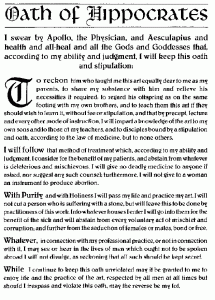 In medicine, doctors swear the Hippocratic Oath, promising that they’ll use their abilities in the best interest of their patients. Whether or not that includes euthanasia doesn’t matter here. The Oath is close to sacred and medical commissions can respond to its violation with severe punishment.
In medicine, doctors swear the Hippocratic Oath, promising that they’ll use their abilities in the best interest of their patients. Whether or not that includes euthanasia doesn’t matter here. The Oath is close to sacred and medical commissions can respond to its violation with severe punishment.
When it comes to affairs of the mind, a similar oath doesn’t exist. A philosopher doesn’t swear to uphold the Truth prior to placing his buttocks firmly on the cushions of an Acedemic Chair – how could he, when he is the one supposed to discover the very nature of truth in the first place?
Yet of course they owe it to – yes, to whom? – that they are rational and rigorous in their explorations, that they make sure they can justify every step in the arguments they chain together to arrive where they wish to arrive. But where is that? I think after a short reflection we’d have to admit that at least in philosophy, we have to consider all options open, or else it would no longer be philosophy.
But what about practical thinkers? Does the dictum “anything goes” also hold for them? Or does the fact that they have to bridge the gap between the mind and the “reality out there”? As they are in the business of “changing the world” (there really is no other business for a practical thinker since Marx) their thought should be action-provoking, just as much as the action of Statesmen from Julius Caesar to Napoleon has been thought-provoking.
[1] Our reality is not what we think it has to be. Something essential is missing from its core.
[2] Our value system is entirely part of our reality.
[3] When we propose radical change, it is necessarily perceived as hypocrisy, that is, as preaching water while drinking wine, as a contradiction between our intellectual proposition and the value system we still incorporate in our actions.
[4] In order to be taken serious, thinkers often prefer to downplay or conceal such hypocrisy: They write lengthy essays about how we can find a compromise, balance, or synthesis.
[5] In honour of every truly revolutionary thinker who has lived and died in this world, we propose to introduce an “Oath of Hypocrisy”, demanding practical thinkers to stay true to the perceived hypocrisy of their novel propositions. This oath won’t of course be effective when sworn in public; it should rather be something like a code of honour of the Practical Thinker’s Guilde.
While this might seem to the reader just word play, it is not. There are plenty of examples of original thinkers we would call hypocrites avant-la-lettre. Take all medieval religious philosophers, who developed rational “proofs” of the existence God that were supposed to stand on their own while being part of a system that considered philosophy the mere maid of theology. Take the slave holding Founding Fathers. Take Jesus preaching water and creating wine. Take modern-day critics of industrial society who jet between conferences about climate change.
The detached logic described here serves only to show that, maybe, the perceived hypocrisy of its messenger is a necessary condition for real change, and perhaps even for the discovery of truth.